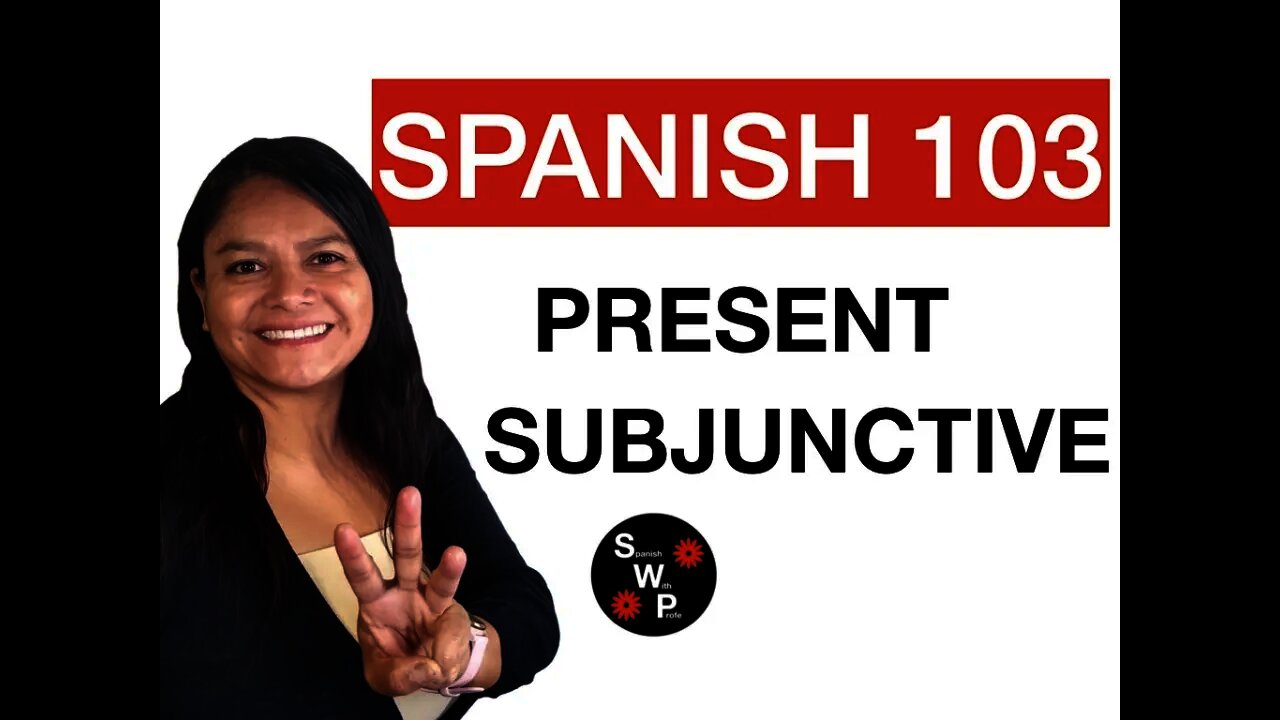Premium Only Content

Spanish 103 - Learn the Present Subjunctive in Spanish for Beginners Spanish With Profe
In this video you will learn the present subjunctive in Spanish. The present subjunctive is a mood. The subjunctive cannot stand by itself. It depends on verbs of will/want, emotions, denial, doubt, desire, impersonal expressions, negation, general expressions, God, ojalá.
It happens on the subordinate clause.
There are regular verbs, irregular verbs, stem-changing verbs. There are also spelling changes.
To remember the subjunctive you can make use of the following acronyms: WEDDING or WEIRDO.
WEDDING=W-stands for Wish/Want/Will, E for emotion, D for desire, doubt, denial, I for impersonal expressions, and G for God; and WEIRDO=W for Wish/Want/Will; E for emotions, I for impersonal expressions, D for denial/desire/doubt, and O for ojalá.
Any time you see Ojalá you will use the subjunctive. An expression now meaning hopefully in Spanish comes from the Arabic "إن شاء الله - 'in sha' allh" meaning God Willing; a prayer to God/Allah. Large parts of Spain were conquer by Muslims invaders from North Africa from 711-1492AD. Only the very far northern Christian Kingdoms of the Iberian Peninsula remained independent. As a result of this 800 year occupation we have many words in Spanish that have their origin in Arabic
The subjunctive mood is formed by changing the -ar endings to their opposite vowel.
-ar
yo -e
tú -es
él, ella, usted -e
nosotros/as -emos
ellos, ellas, ustedes -en
The subjunctive mood is formed by changing the -er/-ir endings to their opposite vowel.
-er/-ir
yo -a
tú -as
él, ella, usted -a
nosotros/as -amos
ellos, ellas, ustedes -an
Most irregular verbs will be formed by using the present Yo form and dropping the "o" and exchanging it for the new vowels.
hacer=hago = haga
salir=salgo = salga
poner=pongo = ponga
You will form the other ones by following the same pattern so:
que yo haga, que tú hagas, que él, ella, usted haga; que nosotros/as hagamos, que ellos, ellas, ustedes hagan
There are other irregular verbs that have to be formed differently for example.
ir= vaya (follow the pattern)
ser=sea (follow the pattern)
saber=sepa (follow the pattern)
the above subjunctive forms are for yo but it will guide you to form the other subject pronouns in the subjunctive
dar=dé, des, dé, demos, den
With dar is very important to put a tilde in the yo and the él, ella, usted forms so it can note that it is the subjunctive form of the verb dar and not the preposition= from= "de"
In the subjunctive the following endings have a spelling change for sound purpose, and the change is applied to all of the subject pronouns: yo, tú, él, ella, usted, nosotros/as, ellos, ellas, ustedes
-car=qu
-gar=gu
-zar=c
-ger=j
You should memorize the following rule to form the subjunctive:
A (subject/person) + verb (weirdo/wedding) + que + B (subject/person) + verb (subjunctive)
Remember that the subjunctive requires a distinct subject A and a verb of the category of weirdo/wedding and a different subject B in order to have the subjunctive form on the verb right after the B person.
Yo quiero que ellos estudien (estudiar) más. ( I want them to study more.)
Yo=subject A
quiero=verb that triggers the subjunctive
que=connects the A and the B together
ellos= subject B
Since we have two different subjects in the sentence and a verb of the weirdo/wedding category we must use the subjunctive form of the verb (estudiar) by changing its ending to the opposite vowel.
Nosotros esperamos que tú llegues (llegar) temprano. (We hope that you arrive early.)
Nosotros= subject A
esperamos= verb that triggers the subjunctive
que= connects the A and B together
tú= subject B
Since we have two different subjects in the sentence and a verb of the weirdo/wedding category we must use the subjunctive form of the verb (llegar) by changing its ending to the opposite vowel.
Since llegar ends in -gar we must change it to -gu and then apply the new vowel.
Stem-changing in the subjunctive is very similar to the present indicative. There will be stem-changing in -ar, -er/-ir
for the subject pronouns: yo, tú, él, ella, usted, , ellos, ellas, ustedes
o=ue, e=ie, and e=i
However in the subjunctive nosotros will do the following:
No stem-change in -ar and -er similar to the present indicative
but there will be stem-changing in the -ir ending for nosotros/as
o=u, e=i
Ellos esperan que nosotros nos durmamos (dormirse) temprano.
(They wish for us to fall asleep early.)
Some Ways Below To Help Out The Channel Listed Below
► DONATIONS via PayPal (To help support the channel you can donate via PayPal): https://paypal.me/SpanishWithProfe?locale.x=en_US
► ROBINHOOD (Get 1 Stock When You Sign Up. Easy to use app for investing and you get a free stock.): https://join.robinhood.com/grants1730
► WEBULL (Get 2 Stock When You Sign Up):https://www.webull.com/activity/get-free-stocks?inviteCode=uYiu2aNdG46N&source=invite_gw&inviteSource=wb_oversea
► CRYPTO.COM Use my referral link https://crypto.com/app/e3p3g4rc9m to sign up for Crypto.com and we both get $25 USD :)
-
 0:42
0:42
Spanish With Profe
1 year agoLearn how to say #flood in Spanish #inundación
310 -
 20:54
20:54
Jasmin Laine
14 hours ago"Why Are You AVOIDING Me?"—Poilievre GRILLS Carney as He CRUMBLES Under Pressure LIVE
99624 -
 7:13
7:13
China Uncensored
16 hours agoChina’s Military Is Out of Control. Can This INSANE Plan Stop It?
1.34K5 -
 1:46
1:46
WildCreatures
17 days ago $0.21 earnedButterfly risks its life to drink crocodile tears in the Pantanal
1.76K3 -
 24:38
24:38
Professor Nez
16 hours agoTrump Just SHOOK the Democrats to the CORE with THIS MOVE!
7309 -
 14:16
14:16
Actual Justice Warrior
3 days agoManhattan DA Says It's Okay To ATTACK Pro Life Activists
5.43K29 -
 5:31
5:31
Buddy Brown
1 day ago $0.95 earnedJames Comey Forgot This Video EXISTS! | Buddy Brown
18.5K10 -
 20:47
20:47
James Klüg
1 day agoAsking Democrats What Ended The Border Crisis Vol. 3
15.8K30 -
 18:09
18:09
Forrest Galante
1 day agoI Survived 24 Hours In The World's Deadliest Jungle
165K21 -
 15:23
15:23
GritsGG
14 hours agoBad Start Leads to Ultimate Warzone Victory w/ Bobby Poff!
8.33K1